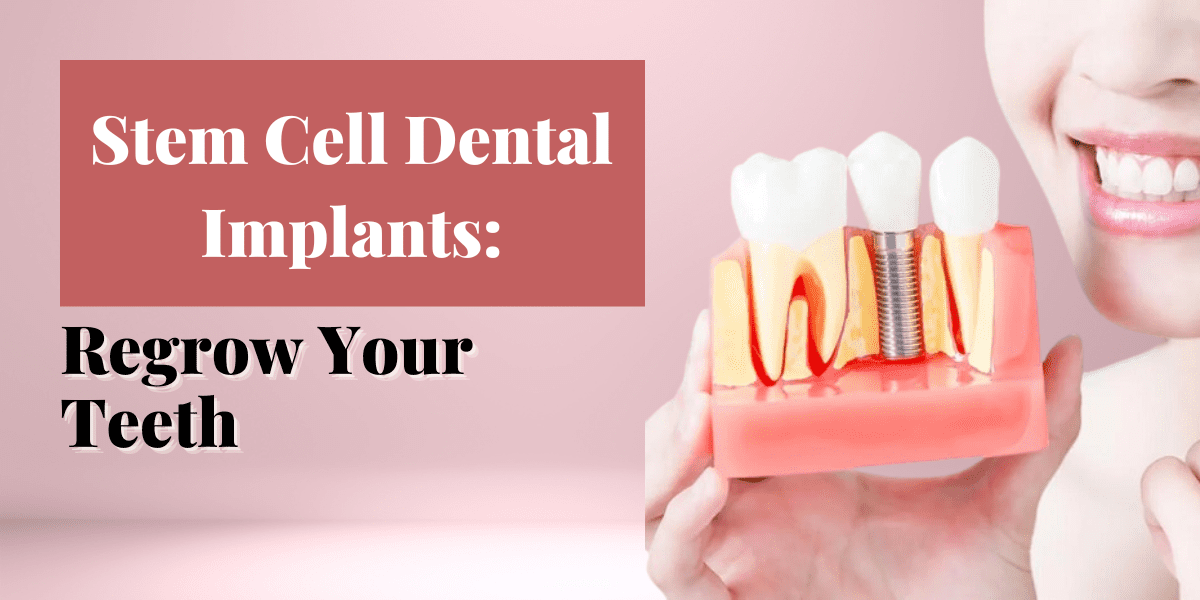
Dental implants are not a new concept. They’ve been around for decades. But what is new is the technology behind them. In the past, dental implants were made from metal. But now, a new kind of dental implant is made from stem cells. And this new kind of dental implant is changing the game.
What Are Stem Cell Dental Implants?
If you’re missing teeth, you may consider your replacement options. Traditional dental implants are made of metal and can be challenging to keep clean, while dentures can be uncomfortable and inconvenient. Now, there’s a new solution on the horizon: stem cell dental implants.
Stem cell dental implants are made from a material that is derived from stem cells, which are cells that can differentiate into other types of cells.
This means that the implant can fuse with the bone and become a part of the jaw, providing a more secure and stable base for the artificial tooth. Additionally, because stem cells can regenerate, this type of implant can help to promote new bone growth in the jaw.

How Does Stem Cell Dental Implants Work?
Stem cell dental implants are a newer type of implant that uses stem cells to speed up healing and bonding. Stem cells are unspecialized cells that can develop into many different types, including bone and cartilage. When stem cells are used in dental implants, they can help the implant fuse to the jawbone more quickly and effectively. This means you can get your new teeth faster and with fewer complications.
Are Stem Cell Dental Implants Safe?
Yes! Stem cell dental implants are made from materials compatible with the human body and have been used in other medical applications for years. In addition, this type of implant is much less likely to cause an allergic reaction than traditional metal implants.
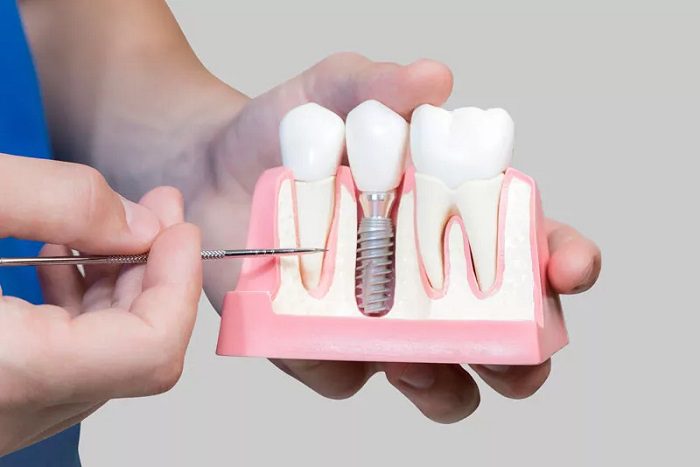
What Are the Benefits of Stem Cell Dental Implants?
Reduced Risk of Infection
One of the biggest benefits of stem cell dental implants is their reduced risk of infection. This is because stem cells can fight infection and promote healing. Additionally, stem cell dental implants are placed directly into the bone, which helps to reduce the risk of disease.
Quicker Healing Time
Another benefit of stem cell dental implants is that they tend to result in a quicker healing time. This is because stem cells help to stimulate the growth of new bone and soft tissue. As a result, patients who receive stem cell dental implants often find that their implant site heals more quickly than those who receive traditional dental implants.
Reduced Risk of Rejection
Another significant benefit of stem cell dental implants is their reduced risk of rejection. This is because stem cells are derived from the patient’s body, meaning there is no risk of the body rejecting them. On the other hand, traditional dental implants are made from artificial materials that the body can sometimes reject.
Improved Functionality
Stem cell dental implants also improve functionality compared to traditional dental implants. This is because they provide patients with a more natural biting force and sensation. Additionally, stem cell dental implants are less likely to loosen over time to provide patients with long-term results.
Enhanced Aesthetics
Lastly, stem cell dental implants also offer enhanced aesthetics compared to traditional dental implants. This is because they fuse directly to the bone, adding stability and making them less likely to shift out of place over time. Additionally, stem cell dental implants are smaller in size than traditional dental implants, making them less noticeable and more aesthetically pleasing.

What is the Process of Getting Stem Cell Dental Implants?
1. The first step is to consult your dentist or oral surgeon to see if stem cell dental implants are right for you. They will evaluate your case and let you know if you are a good candidate for the procedure.
2. Once it has been determined that you are a good candidate for stem cell dental implants, your dentist or oral surgeon will take a small sample of your blood or bone marrow. This sample will extract the stem cells used in the implantation process.
3. The next step is the actual implantation procedure. This is typically done under local anesthesia so you won’t feel any pain during the process. During the procedure, your dentist or oral surgeon will make a small incision in your gums and insert the titanium implant into your jawbone.
4. Once the implant is in place, your dentist or oral surgeon will inject the stem cells extracted from your blood or bone marrow into the area around the implant site. These stem cells help fuse the implant to your jawbone and promote healing.
5. The final step is to allow the implant site to heal properly. This can take several weeks or even months, depending on your case. Once healed, you can use your new stem cell dental implant just like any other tooth.

What Are The Risks Of Undergoing Stem Cell Dental Implants?
Risks of Infection
One of the most common risks associated with any dental surgery is infection. Infection can occur at the site of the surgery, and it can also spread to other parts of the body. Stem cell dental implants carry a slightly higher risk of infection than traditional dental implants because they require a larger incision.
Infection is a severe complication that can lead to other problems, such as bone loss, tissue damage, and blood poisoning. If you develop an infection after having stem cell dental implants, you will likely need to undergo additional treatment, including antibiotics and possibly even surgery.
Risks of Rejection
Another risk associated with stem cell dental implants is rejection. Your body may recognize the stem cells as foreign invaders and attempt to fight them off. This reaction can cause inflammation and pain at the implant site. In some cases, the body may even reject the implant entirely.
If your body rejects the stem cell implant, you will need to have the implant removed and replaced with a traditional dental implant. This process can be costly and time-consuming. Additionally, there is no guarantee that your body will accept the conventional implant.
Risks of Bleeding and Swelling
As with any surgery, there is always a risk of bleeding and swelling after having stem cell dental implants. Bleeding is usually not a cause for concern and should stop a few days after surgery. However, excessive bleeding or prolonged bleeding may indicate that you have an underlying medical condition that needs to be treated.
Swelling is also joint after surgery. However, if the swelling persists or gets worse instead of better, it could be a sign of infection or another complication. For example, suppose you experience excessive swelling after having stem cell dental implants. In that case, you should contact your dentist or surgeon right away so that they can evaluate the situation and provide proper treatment.

How Long Does It Take to Get Stem Cell Teeth?
The length of time it takes to regrow your teeth depends on a few factors, such as how many teeth you need to regrow and the health of your gums. However, you can typically expect to see results within a few months. Sometimes, the new teeth may take up to six months to grow fully.
How Long Do Stem Cells Dental Implants Last?
The average lifespan of a dental implant is 20 years. However, with proper care and maintenance, they can last even longer. Here are some tips for ensuring your dental implants have a long and healthy life:
Brush twice a day and floss daily: Just like your natural teeth, your dental implants need to be brushed twice a day and flossed daily. This will help remove plaque and bacteria around the implant, keeping it clean and healthy.
See your dentist regularly: It’s essential to see your dentist every six months for a checkup and cleaning. During these appointments, your dentist will check for any signs of problems with your implant or the surrounding tissue. If caught early, most problems can be easily treated.
Quit smoking: Smoking tobacco products can decrease the success rate of dental implants and also increase the risk of implant failure. If you smoke cigarettes or use tobacco products in any form, quitting is the best thing you can do for your dental health.
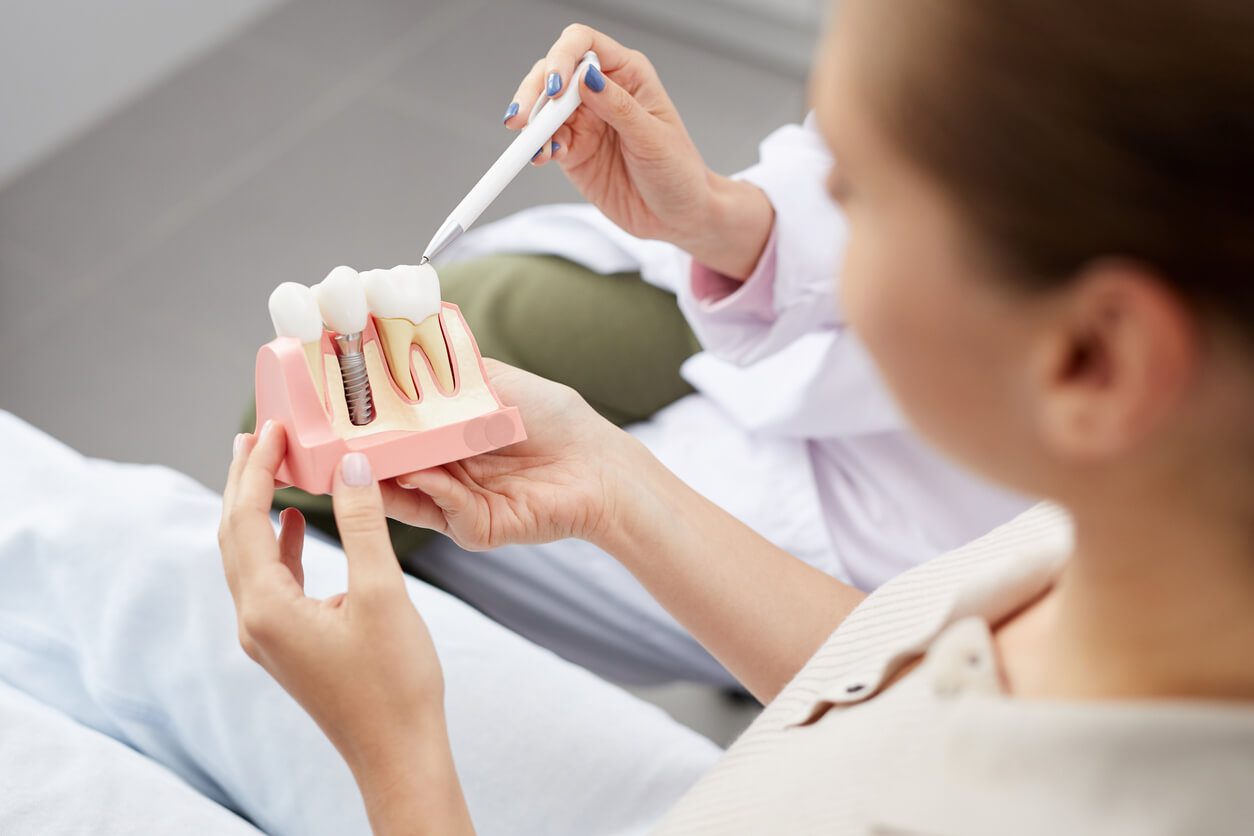
Are Stem Cell Dental Implants Right for Me?
If you are considering dental implants, talk to your dentist about whether stem cell dental implants might be right for you. This newer type of implant may not be available at all dental practices, so it is important to do your research beforehand. In general, stem cell dental implants are best suited for people who:
- Have enough bone mass in their jaws to support the implant
- Are willing to commit to multiple surgical procedures
- Do not have any health conditions that could complicate surgery
- Are not smokers
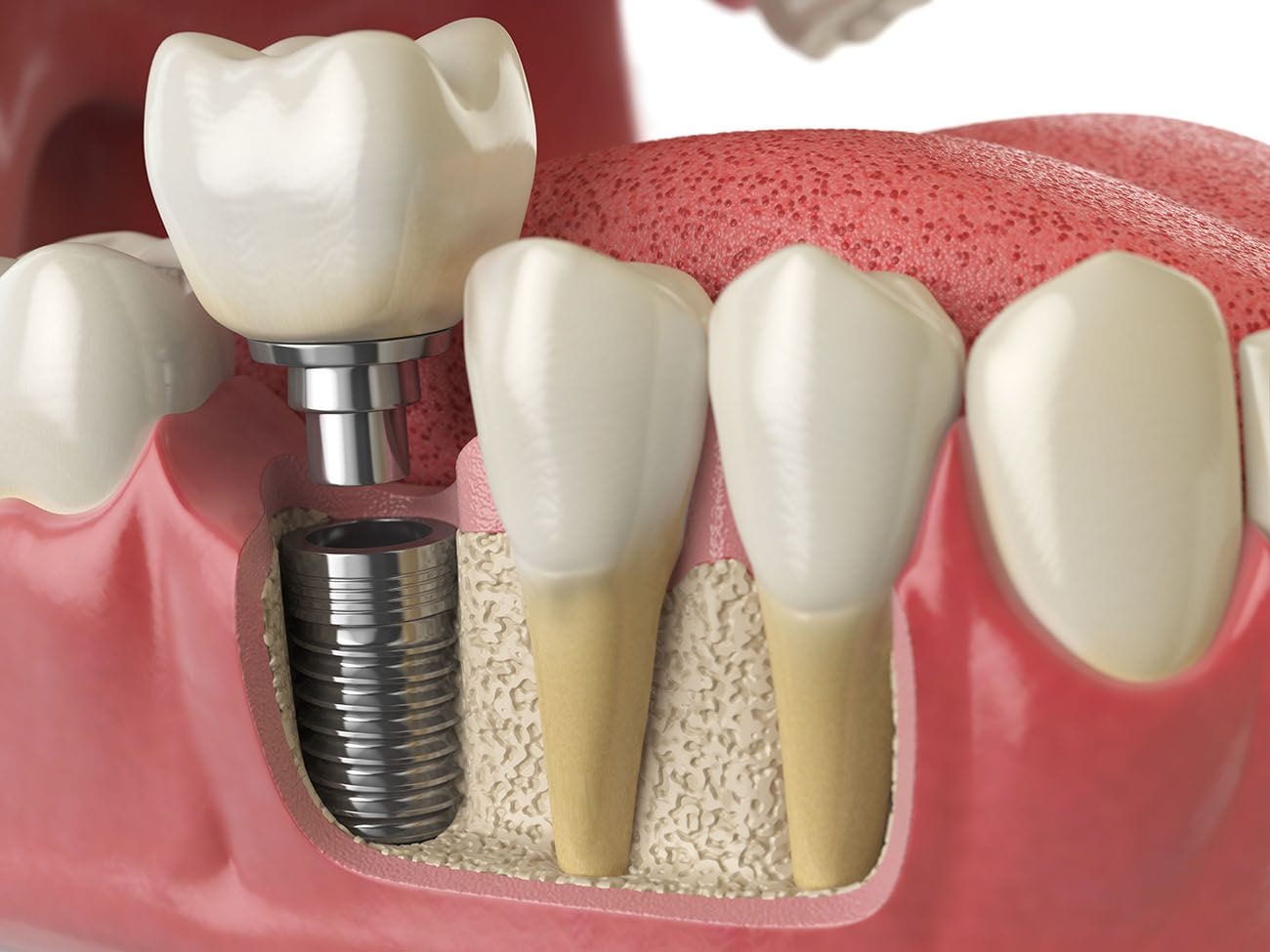
Is It a Tooth Replacement Option Today?
Stem cell dental implants are the newest tooth replacement option on the horizon, offering several advantages over traditional dental implants.
Stem cell dental implants are made from stem cells derived from your bone marrow. The stem cells are then injected into the site of your missing tooth, where they differentiate into various types of cells, including bone and cartilage cells. This process eventually leads to the formation of a new tooth.
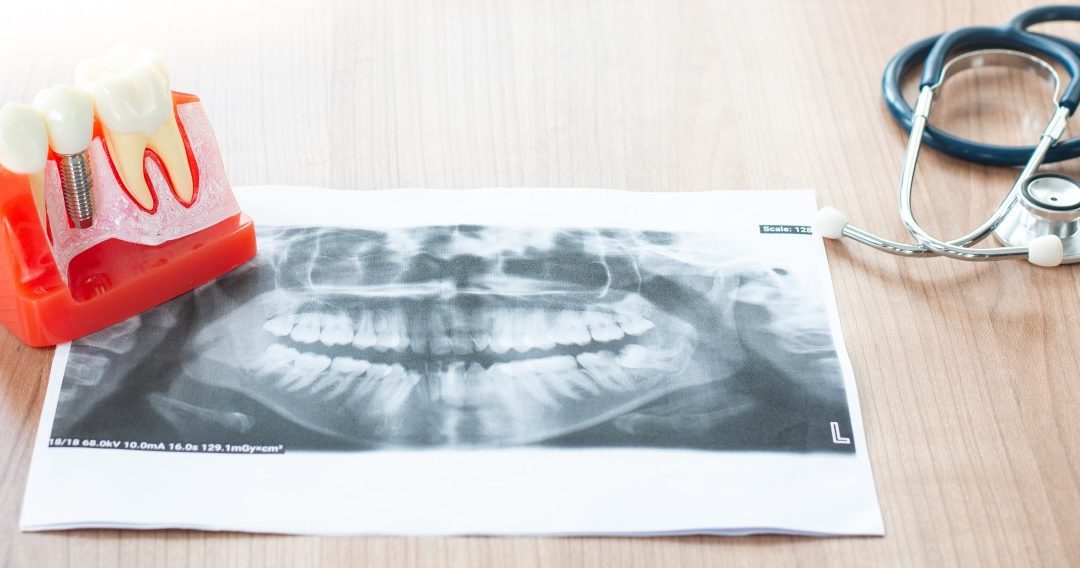
Advantages of Stem Cell Dental Implants
There are several advantages to choosing stem cell dental implants over traditional dental implants, including:
- Shorter Treatment Time – Traditional dental implants can take up to six months for the implant to fuse with the jawbone. With stem cell dental implants, however, this process is accelerated thanks to the presence of stem cells. In most cases, stem cell dental implants can be completed in just two to three months.
- Lower Risk of Infection – Because stem cell dental implants use your cells, there is a lower risk of infection at the implant site.
- Improved Aesthetics – Stem cell dental implants look more like natural teeth than traditional dental implants. That’s because they’re made from living tissue, so they can better mimic the properties of natural teeth.

Final Thoughts
If you are considering dental implants, stem cell dental implants may be right for you. This newer type of implant offers some advantages over traditional dental implants, including a shorter treatment time, lower risk of infection, and improved aesthetics. Talk to your dentist to see if stem cell dental implants are an option for you.
Frequently Asked Questions
Can you get stem cell dental implants?
Stem cell implants are an excellent alternative to traditional dental treatments like bridges or dentures when available; however, the best way to find out if this option works with your needs would probably involve contacting experts.
Do dentists use stem cells?
Stem Cells in Dentistry
Her work with stem cells has helped patients suffering from various periodontal conditions, tooth sensitivity, and jaw pain. She also helps those at risk of needing root canals by using her technique to ease their discomfort in some cases!
Can stem cells regrow gums?
Stem cell treatment is a cutting-edge method for gum disease and other oral health problems. It involves taking stem cells from your own body, which are then replicated in the lab to replace those lost due to damage or wear and tear over time–this helps regenerate teeth, so they stay healthy!
Is there a mineral that can regrow teeth?
Scientists in China have found a way to restore teeth to their original structure with the help of mineral clusters naturally occurring within gels. These specialties stimulate crystal regrowth and repair damage caused by partially acidified enamel, which is crucial for strong dental health.




